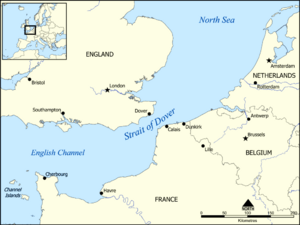Action of 17 March 1917 facts for kids
Quick facts for kids Action of 17 March 1917 |
|||||||
|---|---|---|---|---|---|---|---|
| Part of the First World War | |||||||
 Map of the Strait of Dover |
|||||||
|
|||||||
| Belligerents | |||||||
| Commanders and leaders | |||||||
| Strength | |||||||
| 8 torpedo boats | 4 destroyers | ||||||
| Casualties and losses | |||||||
| None | 1 destroyer sunk, Lieutenant Richard Grenville Bowyer + 1 destroyer damaged |
||||||
The Action of 17 March 1917 was a surprise attack by German torpedo boats during the First World War. This event took place in the Strait of Dover, a narrow sea passage between England and France. German ships targeted British merchant vessels and also fired on the English towns of Ramsgate and Margate.
What Happened?
On March 17, 1917, two groups of German torpedo boats left the coast of Flanders. Flanders is a region in Belgium, which was occupied by Germany at the time. The German boats had a plan to attack British shipping and coastal towns.
The German Plan
The German torpedo boats split into two main groups. One group headed towards the Goodwin Sands. This area is a sandbank in the English Channel, known for its dangerous waters. Their goal was to attack British patrol boats and destroyers there.
The second group of German boats went to the English coast. They aimed for the towns of Ramsgate and Margate. These towns have important ports. The German ships fired their cannons at the towns and the ships docked in their harbors.
The British Response
British ships were patrolling near Goodwin Sands. These included drifters (small fishing boats used for patrol) and destroyers. They tried to fight back against the German attack.
The Battle Begins
During the fight, two British destroyers, HMS Paragon and HMS Llewellyn, were hit by torpedoes. Torpedoes are underwater missiles that can cause huge damage to ships. The Paragon was sunk, and the Llewellyn was badly damaged.
Aftermath
After hitting the British ships, the German forces left the area. They did not lose any of their own ships or crew members. This event was considered a German victory because they achieved their goals without suffering any losses.
See Also
 | May Edward Chinn |
 | Rebecca Cole |
 | Alexa Canady |
 | Dorothy Lavinia Brown |

